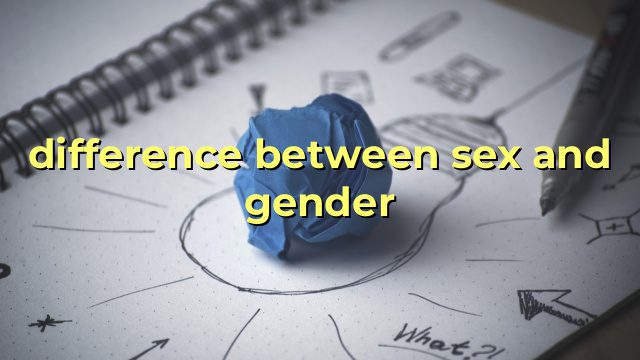The Difference Between Sex and Gender: Why It Matters
When it comes to defining human identity, it’s crucial to understand the difference between sex and gender. Although these terms are often used interchangeably, they have distinct meanings that affect how individuals are treated in society.
What is Sex?
Sex refers to the biological characteristics that define an individual as male or female. This includes physical features such as genitals, chromosomes, and hormones. Most people are born with either male or female anatomy, although there are intersex variations.
Sexual anatomy can be determined through various medical tests, but it’s not always so straightforward. Some people are born with ambiguous genitalia, and others may identify as a different gender than their biological sex. Therefore, sex is not always a clear-cut binary.
What is Gender?
Gender refers to the social and cultural roles, behaviors, and beliefs associated with being male or female. This includes everything from clothing and names to personality traits and career paths.
Unlike sex, gender is a social construct that varies across time and culture. For example, western societies have traditionally valued masculinity as assertive and aggressive, while femininity is associated with nurturing and emotional sensitivity. However, these gender roles are becoming more fluid as society becomes more accepting of a variety of gender identities.
Why Accuracy Matters
It’s critical to understand the difference between sex and gender, as they may not always align. Transgender individuals, for example, identify as a different gender than what they were assigned at birth. Therefore, using the wrong gender pronouns or making assumptions about their gender identity can be deeply harmful.
Additionally, gender biases can have real-world consequences. Women are often paid less than men for the same work, and are underrepresented in many fields. Men may face societal pressure to be the primary breadwinner, which can impact their mental health and overall quality of life.
Being aware of the distinction between sex and gender can help us create more inclusive and equitable societies, where individuals of all genders can thrive without judgment or discrimination.
Conclusion
In short, while sex refers to biological characteristics, gender is a social construct that incorporates personal expression and cultural norms. Acknowledging these differences is essential for creating an inclusive and accepting environment for all individuals, regardless of their gender identity.
Table difference between sex and gender
| Sex | Gender |
|---|---|
| Sex is biological. | Gender is social. |
| Sex is based on physical characteristics like chromosomes, hormones, and reproductive organs. | Gender is based on cultural and social norms, behaviors, and expectations associated with masculinity and femininity. |
| Sex is typically assigned at birth based on observable physical traits. | Gender is a personal and individual identity that may or may not align with one’s assigned sex. |
| Sex is typically limited to two categories: male and female. | Gender is a spectrum that includes a wide range of identities beyond the binary of male and female. |
| Sex is largely determined by biology and genetics. | Gender is largely determined by social and cultural influences. |
